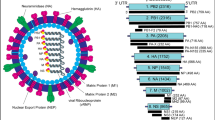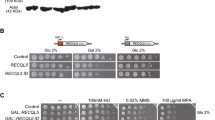Summary
The product of phage P22 gene c1 has two functions: (1) it promotes synthesis of repressor and (2) during the first minutes of infection it retards expression of some lytic genes. We call the second, negative function “c1 retardation”. We investigated c1 retardation in a mutant host of Salmonella typhimurium that is resistant to rifampicin and carries an altered RNA polymerase. No c1 retardation of DNA synthesis was detectable in this host after infection with wild-type phages. This elimination of the normally detectable c1 function leads to the conclusion that the mutant RNA polymerase interferes with the expression of c1 gene activity.
Wild-type phages form clear plaques on the mutant host. Mutants of P22 called cly were isolated by others. These mutants form turbid plaques on the altered RNA polymerase host. Infections with P22 cly in the mutant host resulted in detectable c1 retardation. The cly mutation therefore restores c1 activity in a host in which wild-type c1 is not expressed.
Two spontaneous mutants were isolated from the mutant host. These two strains allowed partial expression of c1 retardation, although they remained rifampicin resistant.
We interpret our data to indicate that expression of the normal functions of gene c1 product requires an interaction of that product with the host RNA polymerase.
Similar content being viewed by others
References
Boyd, J.S.K.: Observations on the relationship of symbiotic and lytic bacteriophage. J. Path. Bact. 63, 445–457 (1951)
Camphell, A.: Sensitive mutants of bacteriophage. Virology 14, 22–32 (1961)
Court, D., Green, L., Echols, H.: Positive and negative regulation by the cI and cIII gene products of bacteriophage λ. Virology 63, 484–491 (1975)
Gough, M., Tokuno, S.: Further structural and functional analogies between the repressor regions of phages P22 and λ. Molec. Gen. Genet. 138, 71–79 (1975)
Harris, A., Mount, D., Fuerst, C., Siminovitch, L.: Mutations in bacteriophage lambda affecting host cell lysis. Virology 32, 553–569 (1967)
Hong, J., Smith, G.R., Ames, B.N.: Adenosine 3′:5′ cyclic monophosphate concentration in the bacterial host regulates the viral decision between lysogeny and lysis. Proc. Nat. Acad. Sci. (Wash.) 68, 2258–2262 (1971)
Levine, M.: Mutation in the temperate phage P22 and lysogeny in Salmonella. Virology 3, 22–41 (1957)
Levine, M.: Replication and lysogeny with phage P22 in Salmonella thyphimurium. Curr. Top. Microbiol. Immunol. 58, 135–156 (1972)
Levine, M., Schott, C.: Mutations of phage P22 affecting phage DNA synthesis and lysogenization. J. molec. Biol. 62, 53–64 (1971)
Lieb, M.: The establishment of lysogenicity in Escherichia coli. J. Bact. 65, 642–651 (1953)
Roberts, J.W., Roberts, C.W., Hilliker, S., Botstein, D.: Transcription termination regulation in bacteriophages P22 and lambda, in RNA Polymerase (ed. Lozick, A., Chamberlin, M.), pp. 707–718. New York: Cold Spring Harbor Laboratory Press 1976
Smith, H.O., Levine, M.: Two sequential repressions of DNA synthesis in the establishment of lysogeny by phage P22 and its mutants. Proc. nat. Acad. Sci. (Wash.) 52, 356–363 (1964)
Steinberg, B., Gough, M.: Altered DNA synthesis in a mutant of Salmonella typhimurium that channels bacteriophage P22 toward lysogeny. J. Virol. 16, 1154–1160 (1975)
Steinberg, B., Gough, M.: Bacteriophage P22 lysogenizes efficiently at high multiplicities of infection because Salmonella typhimurium DNA synthetic capacity is limited. Nature (Lond.) 263, 54–56 (1976)
Tokuno, S., Goldschmidt, E.P., Gough, M.: Mutant of Salmonella typhimurium that channels infecting bacteriophage P22 toward lysogenization. J. Bact. 119, 508–513 (1974)
Tokuno, S., Gough, M.: Host influence on the activity of genes c1 and c3 in regulating the decision between lysis and lysogeny in bacteriophage P22. J. Virol 16, 1184–1190 (1975)
Tokuno, S., Gough, M.: UV sensitivity of a non-repressor regulatory protein of bacteriophage P22. J. Virol. 18, 65–70 (1976a)
Tokuno, S., Gough, M.: Site c27 in phage P22 and control of the pathway to lysogeny. Molec. gen. Genet. 144, 199–204 (1976b)
Tokuno, S., Gough, M.: Regulation of P22 DNA synthesis and repressor levels in P22 cly infections. J. Virol. 21:956–962 (1977)
Author information
Authors and Affiliations
Additional information
Communicated by G. Bertani
Rights and permissions
About this article
Cite this article
Tokuno, Si., Roth, L., Weinberger, C. et al. Effect of mutant host RNA polymerase on the bifunctional activities of P22 gene c1. Molec. Gen. Genet. 153, 205–210 (1977). https://doi.org/10.1007/BF00264737
Received:
Issue Date:
DOI: https://doi.org/10.1007/BF00264737




